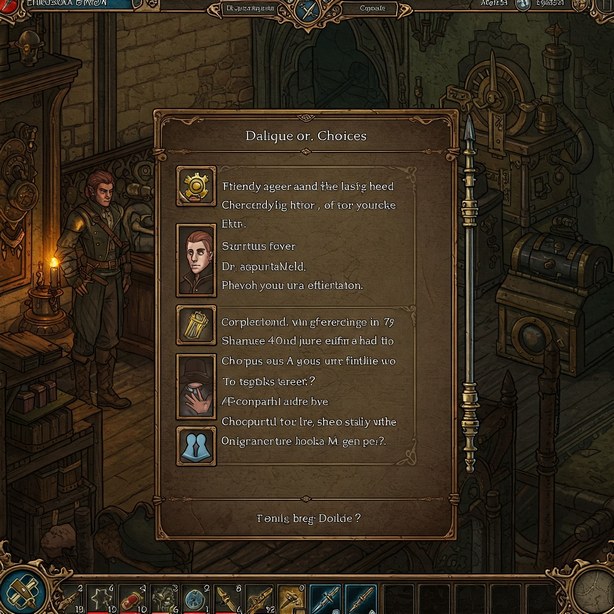Arcanum’s Dialogue System: From Excel to Opcodes
Arcanum, a classic RPG known for its unique blend of magic and technology, also boasts a sophisticated dialogue system. This system, designed by Tim Cain, is built on two core components: an Excel spreadsheet and a generated dialogue system using opcodes.
Excel: The Unsung Hero of Arcanum’s Dialog Trees
In a fascinating video by Timothy Cain, one of Arcanum’s lead designers, we get a glimpse into the inner workings of this system. Each line of dialogue is meticulously crafted and organized within an Excel spreadsheet, with columns dictating the following:
- Order: Column B might contain a number that corresponds to the order the line appears in the conversation, ensuring a natural flow of dialogue.
- Speaker: Column C could be designated for the speaker, indicated by a simple “PC” for the player character or the name of a specific NPC.
- Text: Column D would contain the actual text of the line, the words that the player sees and hears spoken by the characters.
- Conditions: Some columns might include codes that trigger actions within the game. For instance, column J might contain a code that restricts a certain line to only appear if the player character is talking to a follower, ensuring the conversation reflects the existing relationship.
It’s a testament to the versatility and power of Excel, often overlooked as a creative tool. In the hands of the Arcanum team, it transformed into a dynamic storytelling engine, allowing them to craft nuanced conversations, branching narratives, and unique character interactions.
Opcodes: The Building Blocks of Conversation
But the Excel spreadsheet is just the foundation. Arcanum also uses a generated dialogue system that employs opcodes, single-letter codes followed by optional parameters, to control the flow of conversation between NPCs and the player. These opcodes handle various situations, including:
- Greetings: An opcode ‘G’ followed by a number can be used to make an NPC greet the player. The number specifies the type of greeting, such as friendly or hostile.
- Money requests: An opcode ‘M’ followed by a number can be used to make an NPC ask for money. The amount of money can be specified as a parameter.
- Information about the game world: Opcodes can be used to make NPCs provide information about the game world, such as rumors, quests, and locations.
- Buying and selling items: Opcodes can be used to make NPCs buy and sell items from the player.
Social Class and Race: Adding Depth to Dialogue
The system also takes into account the social class of the NPC and the player character, as well as the player’s race. This allows for a more dynamic and reactive dialogue experience. For instance, an NPC shopkeeper might greet a returning player differently depending on whether they liked the player or not.
A Rich and Reactive Dialogue Experience
This combined approach, using Excel for organization and opcodes for dynamic interaction, results in a dialogue system that is both rich and reactive. It reminds players of the choices they made throughout the game and makes the world feel more alive.
Key Takeaways
- Combined Approach: Arcanum’s dialogue system uses both Excel for organization and opcodes for dynamic interaction, demonstrating the power of combining different tools and approaches to achieve creative results.
- Excel’s Hidden Potential: Arcanum’s use of Excel for dialog trees showcases the tool’s often-underestimated versatility in game development and creative applications. It highlights the fact that even common tools can be repurposed for new uses.
- The Anatomy of a Dialog Tree: The video offers a detailed look into how dialog trees are structured and organized, revealing the thought and complexity behind seemingly simple conversations.
- The Power of Opcodes: Opcodes embedded within the spreadsheet add another layer of depth, triggering in-game actions or tailoring dialogue based on specific conditions and player choices. This allows for a more dynamic and engaging conversation experience.
- Considering Player Choices: The system’s ability to take into account the player’s social class, race, and previous actions in the game world makes the dialogue more reactive and rewarding, creating a sense of consequence and replayability.
- Streamlined Development: Using Excel likely streamlined the development process for the dialogue system, allowing the team to easily add, edit, and organize vast amounts of dialogue data.
Arcanum’s dialogue system is a testament to the fact that innovation can flourish in unexpected places. It demonstrates that even the most common tools, like spreadsheets, can be repurposed to create something new and engaging. This approach encourages us to think outside the box and challenge our assumptions about how technology can be used. It also highlights the importance of iteration and experimentation in the creative process. By combining the seemingly mundane task of spreadsheet organization with the creativity of opcode design, the Arcanum team crafted a dialogue system that is both functional and imaginative.
#Arcanum #GameDevelopment #Excel #DialogTrees #Opcodes #BehindTheScenes





